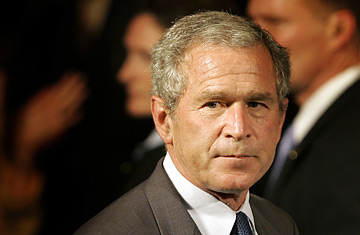
President Bush
Not 100 feet away two other Republican senators held a court of their own, leeching more than a dozen reporters away from the leaders. Senators Olympia Snowe and Susan Collins, both Maine Republicans, were explaining why they feel it's important to pass legislation condemning the surge, which has sent in an additional 30,000 U.S. troops to stem the violence and give Iraqi Prime Minister Nouri al-Maliki a chance to unify the different Iraqi factions behind his government. "The almost complete lack of progress since the surge began on the part of the Maliki government suggests that it has... made reform less likely," Collins said.
Collins, Snowe, as well as the leaders, had just emerged from the caucus's weekly luncheon with Vice President Dick Cheney. During the gathering, Cheney sparred in a "vigorous debate" with several senators on why it's important to wait for Petraeus's first report on the strategy due in September. While most Republicans support the new strategy - which has resulted in the bloodiest few months since the end of "major hostilities" in 2003 — some in recent weeks have begun to defect, calling for a rethinking, or even redeployment, of U.S. troops in Iraq.
The catalysts for the dispute are several amendments to the Pentagon's $649 billion appropriations bill, which is pending before the Senate this week and next. The White House has been engaged in a full court press to prevent other Republican senators from voting for any one of these amendments and giving Democrats the 60 votes they need to overcome a filibuster and attach a timeline for withdrawal to the legislation.
Bush has made personal calls, as has Secretary of State Condoleezza Rice and National Security Advisor Stephen Hadley. Hadley accompanied Cheney to the Hill where he met privately with several senators, underscoring to them the importance of waiting until September.
"I met with Hadley just a minute ago," Graham said heading into the lunch. "I think it's pretty clear that ... the White House will oppose all the amendments that will basically undercut the surge."
Senator Gordon Smith, an Oregon Republican, was one of the senators Bush has reached out to in recent weeks on Iraq. In a "personal conversation," Bush tried to convince Smith to hold his fire until September, Smith said. "It was very heartfelt," Smith said. "He explained a few things that we couldn't know except from his perspective and I appreciated that." But it didn't prevent Smith from this week endorsing the Democratic plan sponsored by Senate Armed Services Chairman Carl Levin that would begin withdrawing U.S. troops from Iraq within 120 days.
Speaking in Cleveland just as senators were heading to lunch in Washington, Bush, himself, made the point Tuesday that the surge hasn't been given enough time to work. "We just started. We got all the troops there a couple of weeks ago," Bush told a business group, adding that he would essentially veto anything that could affect the surge. "American people expect... for military people to come back and tell us how the military operations are going, and that's the way I'm going to play it as commander-in-chief."
The threat did not deter a bevy of proposals as Democrats and Republicans alike shopped for the magic formula to get them to 60 votes. Senator Ken Salazar, a Colorado Democrat, and a group of five other Democrats and six Republicans introduced an amendment that would put in place the recommendations of the Iraqi Study Group — including direct talks with Syria and Iran and beginning a phased withdrawal of U.S. troops — an idea panned by conservatives as going backward seven months in the face of the new surge strategy.
Senator Jim Webb, a Virginia Democrat, introduced a measure that would force the armed services to give troops longer intervals at home between redeployments. With the other leaders before the television cameras, Senator John McCain criticized that idea as "encroachment on the constitutional rights of the President of the United States."
Collins, who had a "vigorous" conversation of her own with Rice Tuesday morning, said she and Nebraska Senator Ben Nelson, a Democrat, are working on legislation that would have binding recommendations for phased troop withdrawals. At the same time, she is also considering signing onto a yet-to-be-announced amendment by Republican Senators John Warner of Virginia and Richard Lugar of Indiana.
Lugar, the top Republican on the Intelligence Committee, publicly came out against the surge in a surprise speech on the Senate floor two weeks ago. Warner said he will reveal his opinion on how the surge is faring in the amendment, which will be unveiled later this week after Bush delivers a scheduled progress report on Iraq expected Thursday.
While the defections were numerous, the Republican leadership is confident that it will maintain enough votes to block all the controversial amendments, according to several GOP staffers. And, at least one skeptic left lunch pledging to wait until September: Senator Norm Coleman, a Minnesota Republican.
"Our role ultimately is not going to be at the forefront of being at an ascent of a civil war in Baghdad ... I have no question that that is something we have to be out of, that we will be out of," Coleman told reporters. "The question is, will we be out of it in September with the Iraqis having moved forward with power sharing or not.
